Jul 08
2024
Author Interview—Natalia Theodoridou, “Restore, Reflect, Retry”
Posted by: K L | Comments (9)
You’ve played this game before. It’s a haunted game about a haunted game. You may not remember, but the game remembers you. I remember you.
Restore, Reflect, Retry is an interactive horror novel by Natalia Theodoridou. We sat down with Natalia to talk about his work. Restore, Reflect, Retry releases this Thursday, July 11th.
I cannot believe we’re conducting an author interview for your fourth game with us, and I’m so excited for this one. Restore, Reflect, Retry is a little (a lot!) different than anything you’ve published with us before. How would you introduce our readers to this game?
This is a haunted game about a haunted game. It is the story of a 1980s kid being nostalgic about a childhood he never had. It is an analog horror game where the horror is ancient and familiar and lives in your house, and a science-fiction game where the science is fleshy and messy and only a squint away from the occult. It’s for the queer kids and the nerdy kids and the kids from broken homes, in whatever way your home was broken. It’s a bandaid and a nod—from my weird little heart to yours.
What tempted you to zig-zag from a more traditional narrative in writing this one?
I’m not gonna lie, I had so much fun writing this game. I poured everything I love into it, allowed myself to indulge in everything that caught my interest and to follow lines of thinking down rabbit holes in a way that I hope will be fun to read, at least for people whose weirdness slants in ways similar to mine. I was never one for neat, linear narratives, and this time I wanted something that reflects (teehee) that in form as well as content. I wanted to play around with the conventions we abide by when we build and play games, when we write and read fiction. To allow a few moments when we—the two of us—can face each other: what we give and what we take from one another, the truths we can afford and the lies we choose to believe in order to make a story work.
What did you find challenging about that?
The kind of thing I’m describing can quickly become too intellectual and self-indulgent, so one of my challenges was to allow the game to be self-aware and meta enough to ask the questions I wanted it to ask while still being a game game, as in something that can actually be played and has stakes that make winning or losing (which, like most things in life, is a spectrum!) matter. I’m hoping that I’ve struck the right balance at least for some players.
You’re out there somewhere, surely. Aren’t you?
How has your relationship with interactive narrative shifted as you’ve gone from (Nebula finalist!) Rent-A-Vice to An Odyssey: Echoes of War to (Nebula finalist!) Sins of the Sires to this game?
All of my games have carried much of myself in them in different ways, but Restore, Reflect, Retry is, I think, the one that most closely captures both how my brain works and what I want my art to do. It also cares (a lot!) about the player’s experience and tries to anticipate and dramaturg it more explicitly than any of my other games. That’s part of the interactivity of this game: the Player is invited to play themself as well as their Player Character, and to consider the ways these people interact with each other and with the game. (And with me! Hi.)
Did you take any particular inspirations from other works for Restore, Reflect, Retry?
Oh, so much inspiration, from so many places. This game is intertextuality galore. The obvious ones are Creatures Such As We (love that game and what it does with the fourth wall), Stranger Things (it’s strange to think of the ‘80s as a setting for period drama, but here we are, people, we are old), True Detective (you are a flat circle), The Haunting of Hill House (the book, not the TV show) (OK maybe the TV show, too), Tomorrow and Tomorrow and Tomorrow (for the love of game design and the people who love it), everything Cronenberg (insert that VHS right into your chest), everything Roland Barthes (the Author is dead and also possibly a ghost). Lots of creepypasta, too, of course (as a genre more than any specific story).
What else are you working on these days?
Most of my focus is on putting finishing touches and preparing for the publication of Sour Cherry, my debut novel, in April 2025, but I have also started working on my next (probably?) novel (most likely?), about a group of queers in post-civil-war Greece and the ghosts that haunt a nation.

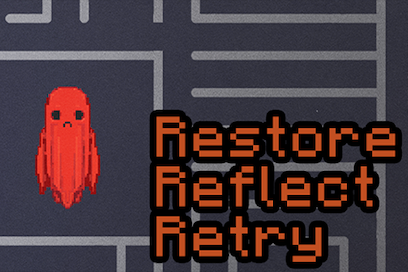
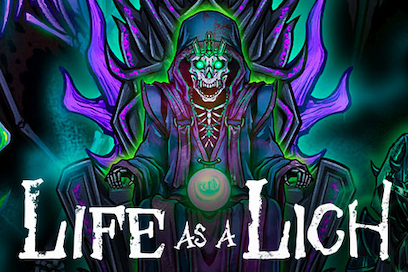
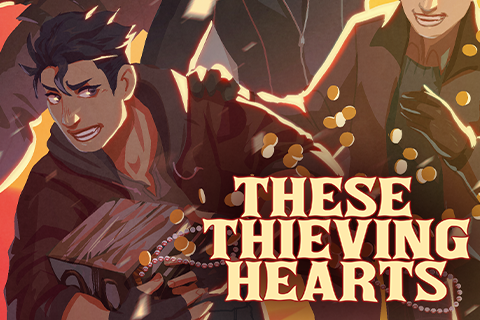
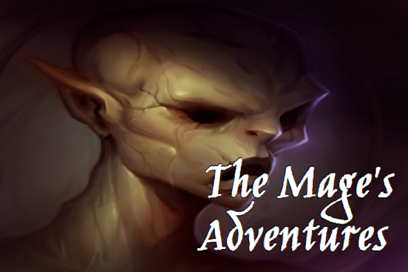


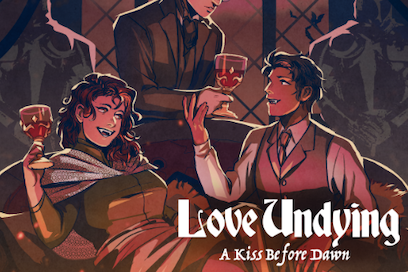

 Steam
Steam Twitter
Twitter Facebook
Facebook Tumblr
Tumblr RSS Feed
RSS Feed

